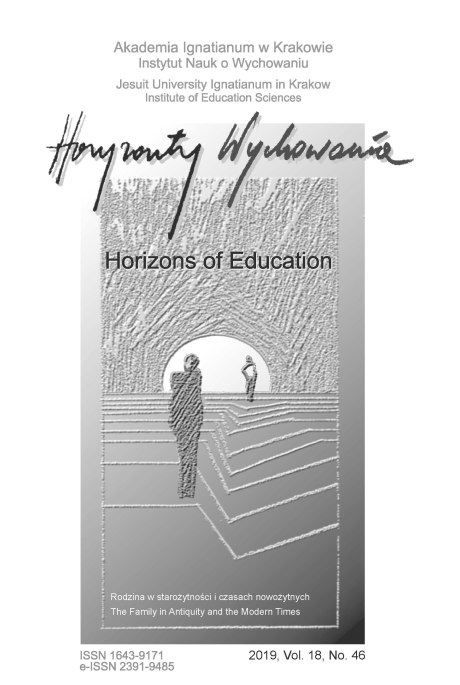Idzi Rzymianin o wspólnocie domowej jako grupie społecznej i środowisku wychowawczym
Giles of Rome on Home Community as a Social Group and Educational Environment
Author(s): Witold BrzezińskiSubject(s): Christian Theology and Religion, Philosophy of Middle Ages, Family and social welfare
Published by: Uniwersytet Ignatianum w Krakowie
Keywords: family; domestic community; marital relationships; relationships between parents and children; giles of rome;
Summary/Abstract: RESEARCH OBJECTIVE: The objective is to reconstruct the 13th-century theologian and philosopher Giles of Rome’s views on the family and family life presented in his treatise De regimine principum. THE RESEARCH PROBLEM AND METHODS: The analysis of the content of the above mentioned work was aimed at answering the following questions: how did Giles of Rome understand the family defined nowadays as the basic social group, what importance and role did he attribute to it in an individual’s life, what model of relationships between a husband and a wife and between a father (parents) and a son (children) did he propose? THE PROCESS OF ARGUMENTATION: first the author and his treatise were characterized, and then the results of the analysis of the content of his work. RESEARCH RESULTS: for Giles of Rome the equivalent of the family defined nowadays as the basic social group is the domestic community – people living together. Apart from parents and children, it also includes servants. The presence of offspring, although making it an ideal community, is not indispensable for the domestic community coming into being. What unites people living together is not close emotional ties, but subordination to the master of the household. His power is perceived by Giles as not so much his right to decide about household members, but as his responsibility and duty to care for them. It is expressed in the obligation of their material maintenance and directing their behaviour in order to improve them ethically. Therefore, the domestic community is not only a place where they meet their everyday needs, but also the educational milieu. CONCLUSIONS, INNOVATIONS, AND RECOMMENDATIONS: the article is a contribution to learning the concept of the family and family life presented in high medieval social and philosophical writings, the studies of which should also cover the works of other authors of this time, as well as knowing their ancient sources whose reception also this period brought.
Journal: Horyzonty Wychowania
- Issue Year: 18/2019
- Issue No: 46
- Page Range: 31-40
- Page Count: 10
- Language: Polish

